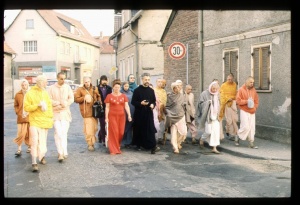SB 4.26.25: Difference between revisions
m (1 revision(s)) |
No edit summary |
||
| Line 1: | Line 1: | ||
{{info | {{info | ||
|speaker=King | |speaker=King Purañjana | ||
|listener=beautiful woman who had become King | |listener=beautiful woman who had become King Purañjana's wife | ||
}} | }} | ||
[[Category:Srimad-Bhagavatam - Canto 04 Chapter 26]] | |||
[[Category:Bhagavatam Verses Spoken by Puranjana Maharaja - Vanisource|042625]] | |||
<div style="float:left">'''[[Srimad-Bhagavatam]] - [[SB 4|Fourth Canto]] - [[SB 4.26: King Puranjana Goes to the Forest to Hunt, and His Queen Becomes Angry|Chapter 26: King Purañjana Goes to the Forest to Hunt, and His Queen Becomes Angry]]'''</div> | |||
<div style="float:right">[[File:Go-previous.png|link=SB 4.26.24]] '''[[SB 4.26.24]] - [[SB 4.26.26]]''' [[File:Go-next.png|link=SB 4.26.26]]</div> | |||
{{RandomImage}} | |||
==== TEXT 25 ==== | ==== TEXT 25 ==== | ||
<div | <div class="verse"> | ||
vaktraṁ na te vitilakaṁ malinaṁ viharṣaṁ | :vaktraṁ na te vitilakaṁ malinaṁ viharṣaṁ | ||
saṁrambha-bhīmam avimṛṣṭam apeta-rāgam | :saṁrambha-bhīmam avimṛṣṭam apeta-rāgam | ||
paśye stanāv api śucopahatau sujātau | :paśye stanāv api śucopahatau sujātau | ||
bimbādharaṁ vigata-kuṅkuma-paṅka-rāgam | :bimbādharaṁ vigata-kuṅkuma-paṅka-rāgam | ||
</div> | </div> | ||
| Line 16: | Line 22: | ||
==== SYNONYMS ==== | ==== SYNONYMS ==== | ||
<div | <div class="synonyms"> | ||
''vaktram''—face; ''na''—never; ''te''—your; ''vitilakam''—without being decorated; ''malinam''—unclean; ''viharṣam''—morose; ''saṁrambha''—with anger; ''bhīmam''—dangerous; ''avimṛṣṭam''—without luster; ''apeta-rāgam''—without affection; ''paśye''—I have seen; ''stanau''—your breasts; ''api''—also; ''śucā-upahatau''—wet because of your tears; ''su-jātau''—so nice; ''bimba-adharam''—red lips; ''vigata''—without; ''kuṅkuma-paṅka''—saffron; ''rāgam''—color. | |||
</div> | </div> | ||
| Line 23: | Line 29: | ||
==== TRANSLATION ==== | ==== TRANSLATION ==== | ||
<div | <div class="translation"> | ||
My dear wife, until this day I have never seen your face without tilaka decorations, nor have I seen you so morose and without luster or affection. Nor have I seen your two nice breasts wet with tears from your eyes. Nor have I ever before seen your lips, which are ordinarily as red as the bimba fruit, without their reddish hue. | My dear wife, until this day I have never seen your face without tilaka decorations, nor have I seen you so morose and without luster or affection. Nor have I seen your two nice breasts wet with tears from your eyes. Nor have I ever before seen your lips, which are ordinarily as red as the bimba fruit, without their reddish hue. | ||
</div> | </div> | ||
| Line 30: | Line 36: | ||
==== PURPORT ==== | ==== PURPORT ==== | ||
<div | <div class="purport"> | ||
Every woman looks very beautiful when decorated with tilaka and vermillion. A woman generally becomes very attractive when her lips are colored with reddish saffron or vermillion. But when one's consciousness and intelligence are without any brilliant thoughts about Kṛṣṇa, they become morose and lusterless, so much so that one cannot derive any benefit despite sharp intelligence. | Every woman looks very beautiful when decorated with ''tilaka'' and vermillion. A woman generally becomes very attractive when her lips are colored with reddish saffron or vermillion. But when one's consciousness and intelligence are without any brilliant thoughts about Kṛṣṇa, they become morose and lusterless, so much so that one cannot derive any benefit despite sharp intelligence. | ||
</div> | </div> | ||
__NOTOC__ | |||
<div style="float:right; clear:both;">[[File:Go-previous.png|link=SB 4.26.24]] '''[[SB 4.26.24]] - [[SB 4.26.26]]''' [[File:Go-next.png|link=SB 4.26.26]]</div> | |||
__NOTOC__ | |||
__NOEDITSECTION__ | |||
Revision as of 15:07, 29 May 2021

A.C. Bhaktivedanta Swami Prabhupada
TEXT 25
- vaktraṁ na te vitilakaṁ malinaṁ viharṣaṁ
- saṁrambha-bhīmam avimṛṣṭam apeta-rāgam
- paśye stanāv api śucopahatau sujātau
- bimbādharaṁ vigata-kuṅkuma-paṅka-rāgam
SYNONYMS
vaktram—face; na—never; te—your; vitilakam—without being decorated; malinam—unclean; viharṣam—morose; saṁrambha—with anger; bhīmam—dangerous; avimṛṣṭam—without luster; apeta-rāgam—without affection; paśye—I have seen; stanau—your breasts; api—also; śucā-upahatau—wet because of your tears; su-jātau—so nice; bimba-adharam—red lips; vigata—without; kuṅkuma-paṅka—saffron; rāgam—color.
TRANSLATION
My dear wife, until this day I have never seen your face without tilaka decorations, nor have I seen you so morose and without luster or affection. Nor have I seen your two nice breasts wet with tears from your eyes. Nor have I ever before seen your lips, which are ordinarily as red as the bimba fruit, without their reddish hue.
PURPORT
Every woman looks very beautiful when decorated with tilaka and vermillion. A woman generally becomes very attractive when her lips are colored with reddish saffron or vermillion. But when one's consciousness and intelligence are without any brilliant thoughts about Kṛṣṇa, they become morose and lusterless, so much so that one cannot derive any benefit despite sharp intelligence.